Explore practical strategies to keep flies out of your garage, ensuring a clean and pest-free space.
Keeping flies out of your garage can be a daunting task, but it doesn’t have to be. This article provides a comprehensive guide on practical, effective methods to keep these pesky insects at bay.
From natural repellents to fly traps and prevention strategies, every detail you need to maintain a fly-free garage is covered. This information will not only help you eliminate the current fly problem but also prevent future infestations, making your garage a more pleasant space.
So, if you’re tired of swatting flies while working on your car or during your DIY projects, continue reading for the full solution.
Key takeaways:
- Remove liquids and standing water
- Store attractants in airtight containers
- Clean out and remove food sources
- Use sticky traps to capture flies
- Fogging your garage to eliminate flies
Remove Liquids & Standing Water From Your Garage

Eliminating any presence of liquids and standing water in your garage is a crucial step in keeping flies at bay since they are attracted to moisture and dampness. Always get rid of any rainwater or other forms of standing water, as these act as breeding grounds for flies.
Similarly, fluid leaks from vehicles should be promptly attended. Maintain a routine check on your water heaters or pipes, in case of condensation. Use water absorbent materials or a floor squeegee to keep your garage floor dry. Consider installing a dehumidifier if the garage is prone to dampness and condensation.
Store Items That Attract Flies in Airtight Containers
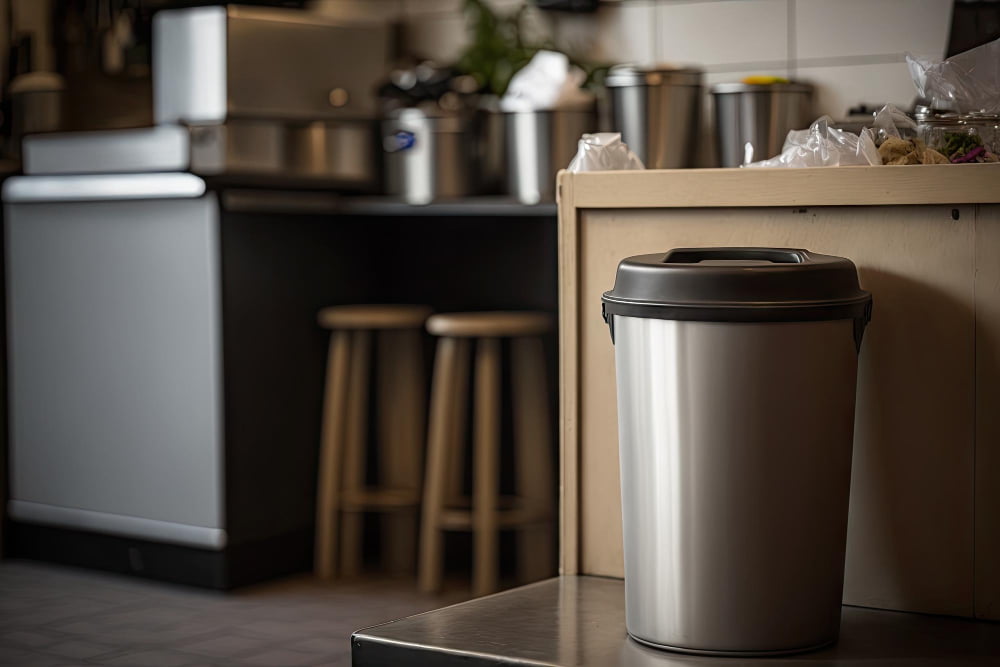
Take note of the items flies commonly find irresistible – including food scraps, sweet liquids, or overripe fruits. These should be kept in sealable containers. Garbage cans should be sealed tightly too, to prevent the pungent aroma from attracting flies.
If you have pet food, it is wise not to leave it out in the open. Flies are also attracted to it and can lay eggs, leading to an infestation. It’s tempting to use the garage as an extension of your kitchen or pantry. However, if this is necessary, ensure these items are stored in airtight containers, which will detour flies. Remember, prevention is often simpler than dealing with the problem after the fact.
Bonus Tip: Regularly cleaning these containers also helps keep them fly-free. The smallest residue can be enough to attract flies. So keep it spick-and-span. Your garage will thank you.
Clean Out and Remove Food Sources From Garage
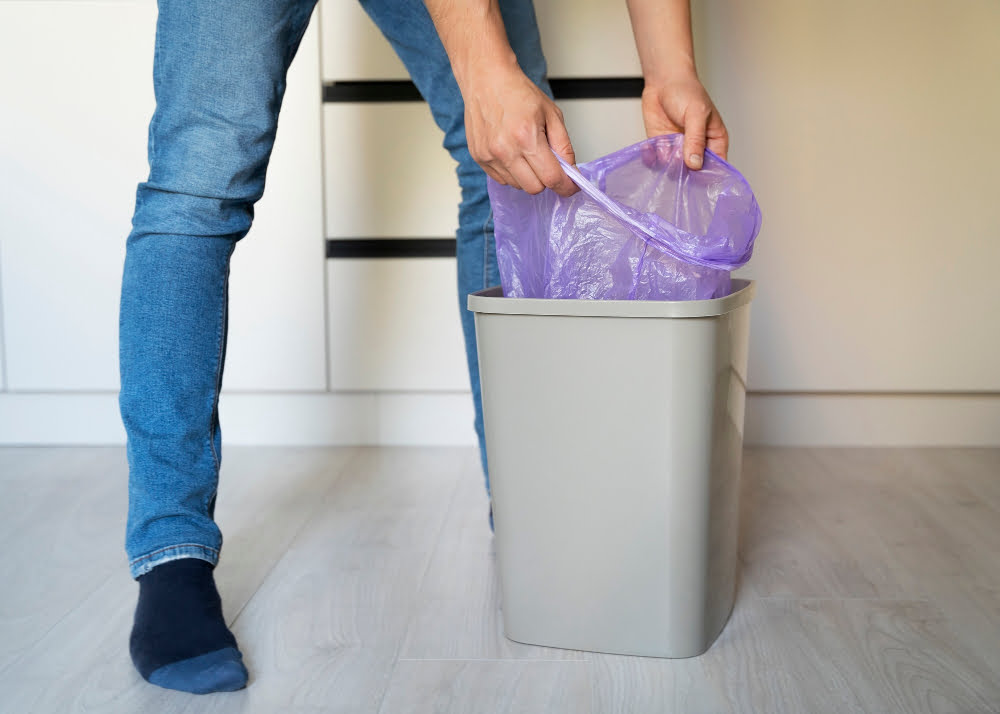
Reducing the availability of fly-attracting substances is key. Remember, the trash bin overflowing with garbage serves as a gourmet buffet for these pests. It’s not just your leftover dinner they lust after; animals find certain organic fertilizers irresistible.
So, step one involves regular trash management. Make sure to dispose of your garbage routinely and not let it pile up. Consider utilizing bins with tightly sealed lids.
Secondly, if you use organic fertilizers for that lush green lawn or rose bushes, ensure these substances are stored securely. Flies love the fermented scent these products emit, so try to minimize this aroma by keeping such products in airtight containers whenever possible.
Lastly, keep an eye for any lingering food particles. Even a tiny piece of rotting fruit or vegetable can summon a fly swarm. Sweep your garage floors regularly, and remember to check for spills or scraps often.
Follow this routine to discourage those unwelcome visitors from turning your garage into their dining room.
Use Sticky Traps to Capture Flies in Your Garage
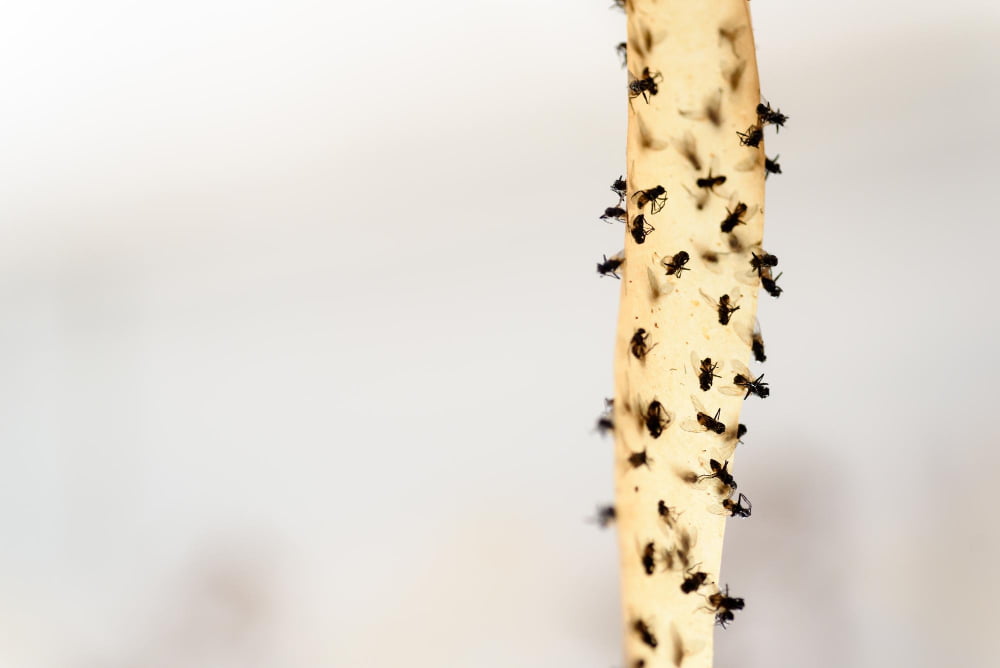
Sticky traps are an effective means of reducing a fly infestation. These traps, often coated with a sweetly fragrant, non-toxic adhesive, lure flies by emulating their natural food sources.
Simply place them in higher traffic areas for optimum effectiveness. The traps require monitoring and should be replaced as soon as they’re full for continued efficiency.
Remember, while these traps are great at catching the flies, they don’t address the root cause of why the flies are there in the first place.
Coupling their use with the other prevention methods we discussed earlier ensures a more robust, effective approach to a fly-free garage.
Fogging Your Garage to Eliminate Flies
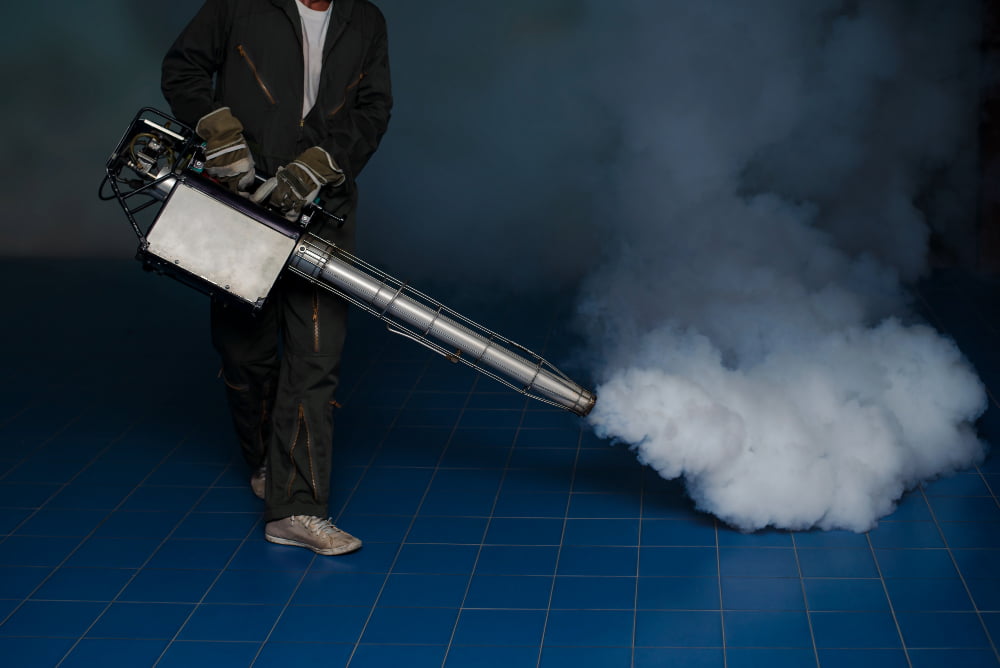
Fogging, a highly effective method for fly control, should be done with care. It entails the use of insecticides, so always wear protective gear and keep the area clear of children and pets.
Start by selecting an EPA-approved fogging insecticide designed to deal with flies. Always follow instructions on the label regarding usage and disposal. Fogging units are available in both thermal and non-thermal varieties, both of which are useful. The thermal fogger creates a dense, visible fog, but requires a bit more caution due to the heat produced. Non-thermal foggers, on the other hand, don’t produce as dense a fog, but are safer and easier to handle.
Ensure to fog all potential fly hiding places, including corners and behind shelving. Keep the windows and doors of your garage closed for the recommended period (usually between 2 to 4 hours). Immediately after this period, ventilate the garage thoroughly to allow the insecticides to disperse.
While fogging has quick results, remember that it’s not a long-term solution to a fly problem. Therefore, it should be used in conjunction with other methods.
Use Scents That Flies Hate to Keep Them Out of Your Garage

Flies have a highly developed sense of smell which can be turned to your advantage. They are extremely repelled by certain scents, which you can use to create an unwelcoming environment for them in your garage.
Citronella: Commonly used in mosquito repellents, citronella oil is also useful in driving away flies. Infused candles or incense sticks can be strategically placed throughout your garage.
Basil: Aside from its culinary uses, basil also deters flies. Consider planting a pot nearby your garage door or windows to keep flies at bay.
Cloves: The scent of cloves is another major turn-off for flies. An easy way to use cloves is by pushing them into a ripe apple and placing it in your garage. This is an effective, natural scent-based repellent.
Vinegar: Create a DIY repellent by combining vinegar with dish soap. The strong smell of vinegar deters flies, while dish soap traps and kills them. Place the solution in an open bowl in your garage.
Remember, the key is strategic placement of these items where flies are likely to enter- near doors, windows or vents.
Perform Proper Lawn Maintenance & Composting to Prevent Flies
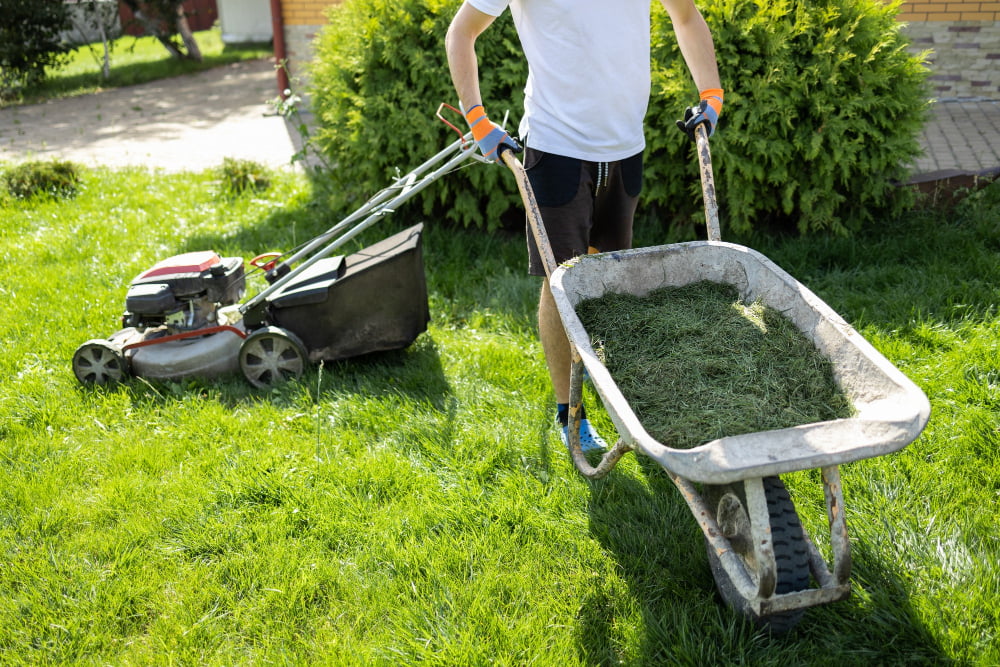
To undermine an attractive breeding ground for flies, maintain your lawn meticulously. It’s advised to regularly mow the lawn, trim back vegetation near your garage, and dispose of any organic waste like leaves and grass clippings. These can become fly breeding hotspots if left unchecked.
Composting is another significant aspect. While compost is beneficial for garden soil, if not managed correctly, it can attract flies. Make sure to have a compost bin with a secure lid and avoid adding meat or fish scraps into the mix, as these are particularly enticing for flies. If possible, locate the compost bin as far away from the garage as possible to further dissuade fly infestation.
Last but not least, avoid overwatering your lawn near the garage. Stagnant water can provide flies with a prime breeding environment. Following these tips would help to keep flies out of garage by making the immediate surroundings less enticing for them.
Seal Entry Points & Cracks in Garage to Deny Flies Access
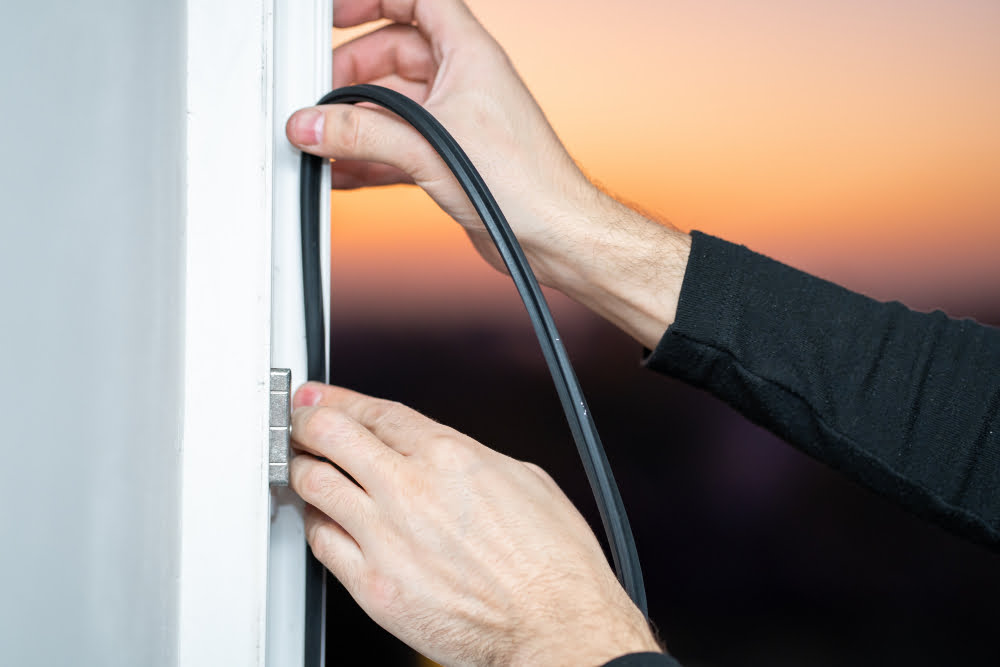
Creating a barrier against any intruders, including flies, can be achieved by diligently identifying and sealing all potential access spots in the garage. Start by scrutinizing the garage doors and windows. Depending on their condition, weather-stripping might be necessary. This inexpensive material can ensure a tighter seal, preventing flies from squeezing through those almost invisible gaps.
Next, turn your attention to the small openings around cables, pipes, and wires entering your garage. These are often overlooked gateways for pests. Use caulk, expandable spray foam, or other suitable sealants to block these gaps effectively.
Walls and floors should be your next focus. Over time, concrete can form cracks, which can serve as an entryway for flies. Epoxy or concrete filler can be your best allies when it comes to dealing with these fissures.
Finally, a key checkpoint is the ventilation system. Ensure that vents are fitted with fine mesh screens to keep out flies without impeding air flow. You want a fresh garage, not a buzzing one.
FAQ
What can I spray in my garage to get rid of flies?
To eliminate flies in your garage, fill a spray bottle with a solution consisting of a few drops of dish soap, a tablespoon each of vinegar and baking soda per cup of water, and use it as a homemade fly repellent.
What smell will keep flies away?
The scents of cinnamon, lavender, eucalyptus, peppermint, and lemongrass essential oils will effectively deter flies.
How do I get rid of flies in my house and garage?
To eliminate flies from your house and garage, create a potent trap by mixing equal parts of apple cider vinegar and fruity-scented dish soap with a pinch of sugar, as the vinegar attracts the flies and the soap effectively exterminates them.
What is the best homemade fly repellent?
The best homemade fly repellent is a mixture of one cup of water and one teaspoon of cayenne pepper, which can be sprayed near entryways and locations where flies are prevalent.
Which plants can be utilized as natural deterrents for flies in a garage?
Basil, lavender, lemongrass, and mint are examples of plants that can be utilized as natural deterrents for flies in a garage.
What are the most effective fly traps suitable for use in a garage environment?
The most effective fly traps for a garage environment include adhesive-based traps like Flypaper and UV light traps that lure and kill flies quickly.
How can proper garage ventilation assist in minimizing the presence of flies?
Proper garage ventilation helps minimize the presence of flies by circulating fresh air that disrupts their breeding habitats and curtails their food sources, thereby making the environment unwelcoming for them.